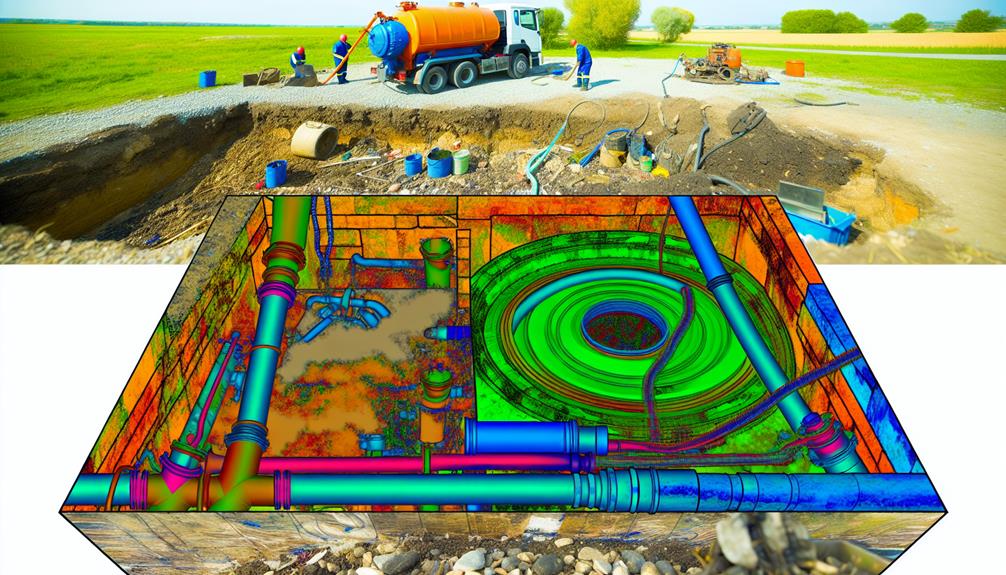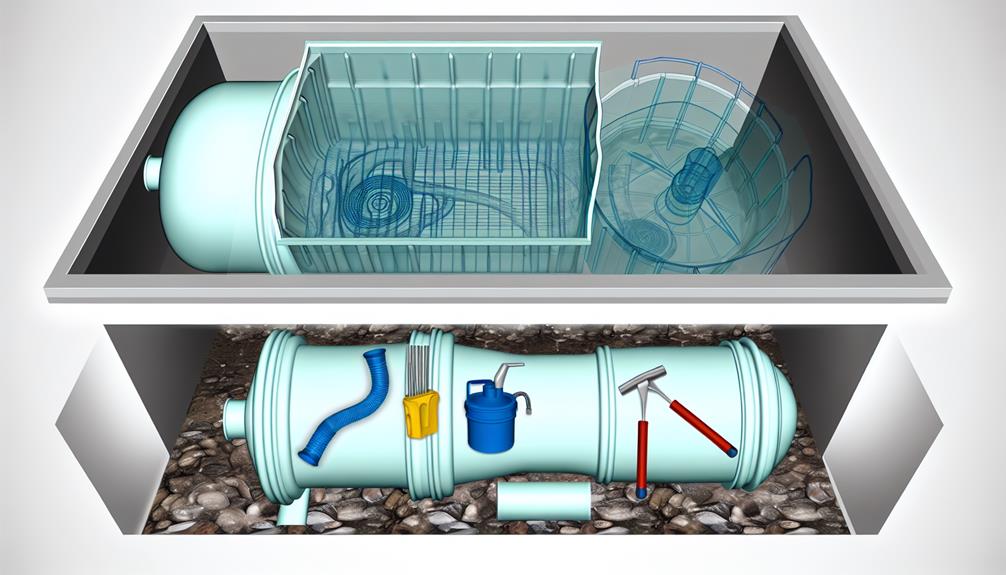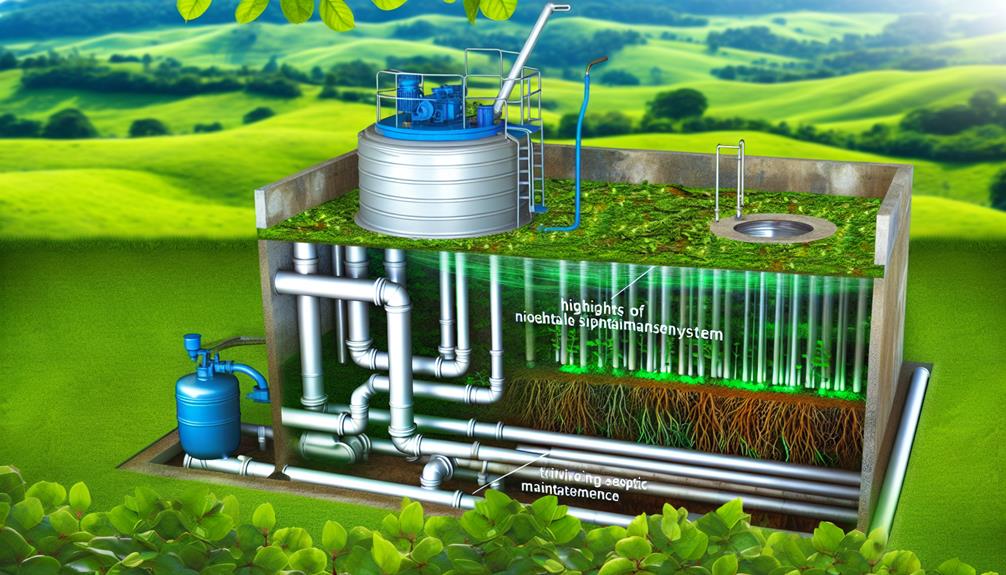Discover how to protect your septic system from breakdown with...
Read MoreYou & Your Septic Tank
Effective Solutions for Regular Septic Tank Pumping Issues
Our professional septic service team offers comprehensive septic tank pumping services to keep your system running smoothly. Get a FREE Quote Today.

Effective Solutions for Regular Septic Tank Pumping Issues
Just as you wouldn’t let the engine of your car run without regular oil changes, you shouldn’t neglect your septic tank pumping either. It’s a chore that may seem daunting, but it’s crucial to the health of both your home and the environment.
You’ve probably encountered a handful of issues when it comes to maintaining this essential home system. From strange noises to unpleasant odors, septic tank problems can disrupt your peace of mind, not to mention the potential damage to your property.
Let’s take a look at some effective solutions for these regular issues and explore how you can prevent them from happening in the first place.
Stay with me, there’s more to uncover.
Key Takeaways
- Regular maintenance, including routine pumping, is crucial for efficient septic tank operation.
- Inadequate pumping frequency can lead to solid waste buildup and system failure.
- Overloading the tank with excessive water use can cause system breakdown.
- Regular inspections help identify and address problems early, preventing costly repairs.
Understanding Septic Tank Pumping

To properly handle septic tank pumping, you’ll need to gain a thorough understanding of the system’s workings, including the function of the tank, the process of decomposition, and the importance of regular maintenance.
The tank’s primary role is to hold wastewater long enough for solids to settle down as sludge while the grease and oil float to the top as scum. The tank capacity plays a vital role in this process. Larger tanks hold more waste, allowing for more efficient decomposition before pumping is necessary.
Decomposition occurs naturally with the help of bacteria present in the waste. This process reduces the volume of solids, but not all materials break down. What doesn’t decompose builds up, necessitating the need for pumping.
Pumping frequency depends on several factors, namely the tank capacity, the amount of wastewater generated, and the volume of solids in the wastewater. Regular maintenance, including routine pumping, ensures the septic system operates efficiently and prevents overflows or backups.
Understanding these technical details will help you determine the optimal pumping frequency and maintenance schedule for your septic system, ultimately enhancing its longevity and functionality.
Common Septic Tank Pumping Problems
While understanding your septic system’s functionality and maintenance is crucial, it’s equally important to be aware of common problems that may arise during the pumping process.
- Pumping Frequency: The frequency at which you pump your septic tank plays a significant role in its performance and longevity. Not pumping your tank enough can lead to solid waste build-up, causing blockages and system failure. On the other hand, pumping too frequently can interfere with the bacterial balance needed for waste breakdown.
- Overloading Issues: Overloading your septic tank with excessive water use can lead to system breakdown. This increases the risk of waste backing up into your house or contaminating the ground surface. It’s crucial to manage your water usage effectively to prevent this issue.
- System Damage: Physical damage to your septic system, such as cracks or leaks in the tank or pipes, can lead to serious issues. This might include sewage seeping into the ground or backing up into your house. Regular inspections can help identify and address such problems early.
Knowing these common problems, you’re now better equipped to manage your septic system effectively and avoid costly repairs.
Essential Maintenance Tips for Septic Tanks

Ensuring your septic tank’s optimal performance doesn’t just end at understanding common problems, it also lies in practicing essential maintenance routines.
Regular inspection is vital in maintaining your tank’s capacity and lifespan optimization. You should inspect your tank at least every three years.
Avoid overloading your system. This means conserving water, fixing leaks, and spreading laundry loads throughout the week. The less water you use, the less enters your septic system, reducing the chances of overburdening your tank’s capacity.
Pumping is another critical aspect. Regular pumping, based on the size of your household and tank capacity, prevents solid waste buildup, ensuring your system runs efficiently.
Avoid flushing non-biodegradables down your drains. These materials don’t decompose and can cause blockages, reducing your tank’s capacity and shortening its lifespan.
Lastly, protect your drainfield. Plant only grass over and near your septic system—roots from trees and shrubs can clog and damage the system.
These are key steps to ensure your septic tank functions at its best, optimizing its lifespan. Remember, a little maintenance goes a long way in preventing costly repairs and maximizing the performance of your septic system.
Comprehensive Solutions for Pumping Issues
If you’re facing pumping issues with your septic tank, it’s crucial to identify and implement comprehensive solutions promptly to prevent system failure. These issues can range from slow drainage to nasty odors, and without proper attention, they can seriously disrupt your daily life.
Here are three comprehensive solutions that you can consider:
- Pumping Equipment Upgrades: If your current system is outdated or malfunctioning, consider upgrading your pumping equipment. Modern systems offer better efficiency, reliability, and longevity. This investment can save you from recurring problems and costly repairs in the long run.
- Regular Maintenance: Don’t wait for issues to arise before taking action. Regular inspections and maintenance can help identify potential problems before they turn into major issues. It’s better to be proactive than reactive when it comes to septic tank care.
- Eco-friendly Practices: By incorporating eco-friendly practices, you can help preserve the environment while keeping your septic system in top shape. This could include using biodegradable products, reducing water usage, or installing a high-efficiency toilet.
Prevention of Future Septic Complications

After implementing these comprehensive solutions, you’ll need to focus on preventing future septic complications to maintain your system’s efficiency and longevity. An essential part of this is understanding the impact of your activities on your septic system lifespan.
Avoid flushing non-biodegradable items down the drain. These items can clog your system, causing unnecessary strain and reducing its lifespan. Regular inspections and pumping are also vital. This not only ensures that your system is functioning optimally but also helps identify potential problems before they escalate.
Adopting eco-friendly practices can significantly improve your septic system lifespan. For instance, conserving water reduces the load on your system, prolonging its life. Also, avoid using harsh chemical cleaners that can harm the beneficial bacteria in your septic system.
Planting the right kind of vegetation around your septic system is another smart move. Some plants have deep roots that can damage your system, while others, like grass, can protect it.
Conclusion
So, you’ve navigated the messy world of septic tank pumping. Remember, common issues can be tackled with routine maintenance and timely solutions.
Don’t let your tank become Pandora’s box of problems. Stay proactive, keep it in check, and you’ll save a fortune on repairs.
Prevention is the golden key to a smooth-running septic system. And that, my friend, is your pathway to blissful, unblocked domestic harmony.
You may also like...
Why Are DIY Fixes Essential for Septic Tank Pumping?
Tap into the importance of DIY fixes for septic tank...
Read MoreUnveiling the Average Costs of Septic Tank Pumping
Master the mysteries of septic tank pumping costs and avoid...
Read More
The Best Septic Tank Pumping Services Near You

Answer Some Questions
Let us know about your needs so we can find you the right septic tank pros.

Get Quotes
We will put you in touch with the right septic tank pros for your job and location.

Hire Right
Compare quotes, message or call pros, and hire only when ready.



